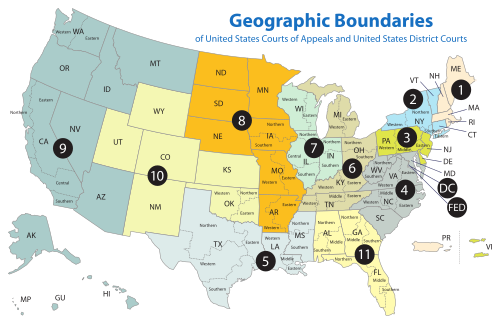Related Research Articles
In the United States, a state court has jurisdiction over disputes with some connection to a U.S. state. State courts handle the vast majority of civil and criminal cases in the United States; the United States federal courts are far smaller in terms of both personnel and caseload, and handle different types of cases.

The United States Court of Appeals for the Eighth Circuit is a United States federal court with appellate jurisdiction over the following United States district courts:

The United States Court of Appeals for the Tenth Circuit is a federal court with appellate jurisdiction over the district courts in the following districts:
Carlos F. Lucero is an American attorney and jurist serving as a senior United States circuit judge of the United States Court of Appeals for the Tenth Circuit.

The Colorado Supreme Court is the highest court in the U.S. state of Colorado. Located in Denver, the Court consists of a Chief Justice and six Associate Justices.

Martin Joseph Jenkins is an American attorney and jurist serving as an associate justice of the Supreme Court of California. He was previously a justice of the California Court of Appeal for the First District, located in San Francisco, and a former United States District Judge of the United States District Court for the Northern District of California.
The Government of Colorado is the governmental structure as established by the Constitution of the State of Colorado. It is composed of three branches: the executive branch headed by the Governor, the legislative branch consisting of the General Assembly, and the judicial branch consisting of the Supreme Court and lower courts. The constitution also allows direct participation of the electorate by initiative, referendum, recall and ratification.
The Judiciary of Colorado is established and authorized by Article VI of the Colorado Constitution as well as the law of Colorado. The various courts include the Colorado Supreme Court, Colorado Court of Appeals, Colorado district courts, Colorado county courts, Colorado water courts, and municipal courts. The administration of the state judicial system is the responsibility of the Chief Justice of the Colorado Supreme Court as its executive head and is assisted by several other commissions. In Denver, the county and municipal courts are integrated and administratively separate from the state court system.
Courts of Georgia include:

Courts of Iowa include:
Courts of Nebraska include:
Courts of Tennessee include:
The Commonwealth of Massachusetts is governed by a set of political tenets laid down in its state constitution. Legislative power is held by the bicameral General Court, which is composed of the Senate and House of Representatives. The governor exercises executive power with other independently elected officers: the Attorney General, Secretary of the Commonwealth, and Auditor. The state's judicial power rests in the Supreme Judicial Court, which manages its court system. Cities and towns act through local governmental bodies to the extent that they are authorized by the Commonwealth on local issues, including limited home-rule authority. Although most county governments were abolished during the 1990s and 2000s, a handful remain.
Colorado district courts are the state trial courts of general jurisdiction in the U.S. state of Colorado.

The Judiciary of California or the Judicial Branch of California is defined under the California Constitution as holding the judicial power of the state of California which is vested in the Supreme Court, the Courts of Appeal and the Superior Courts. The judiciary has a hierarchical structure with the California Supreme Court at the top, California Courts of Appeal as the primary appellate courts, and the California Superior Courts as the primary trial courts.
References
- ↑ "Colorado Judicial Branch". Archived from the original on 2006-08-12. Retrieved 2008-12-21.
- ↑ "Colorado Judicial Branch - Court of Appeals". Archived from the original on 2008-02-12. Retrieved 2008-12-21.
- ↑ "Colorado State Judicial Branch - District Courts". Archived from the original on 2002-10-07. Retrieved 2008-12-21.
- ↑ "Colorado State Judicial Branch - County Courts". Archived from the original on 2002-10-07. Retrieved 2008-12-21.
- ↑ "United States District Court for the District of Colorado". Cod.uscourts.gov. Retrieved 2008-12-17.
